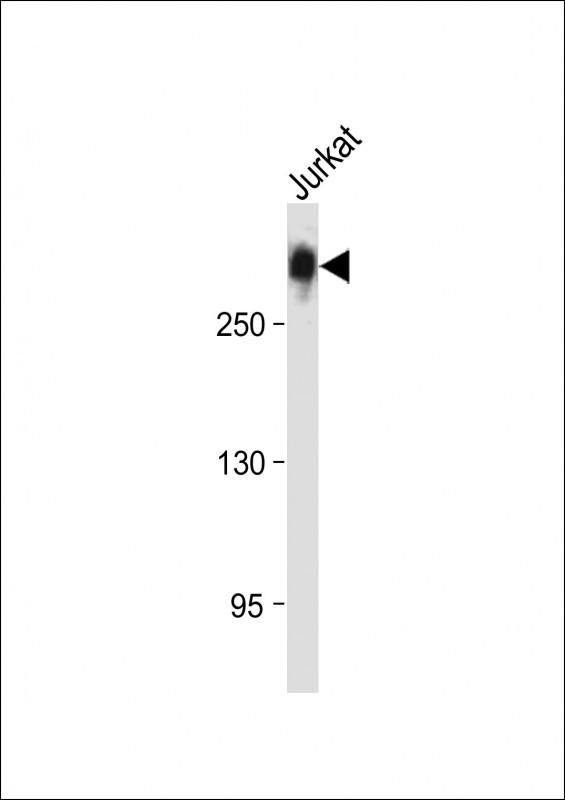
| WB | 咨询技术 | Human,Mouse,Rat |
| IF | 咨询技术 | Human,Mouse,Rat |
| IHC | 咨询技术 | Human,Mouse,Rat |
| ICC | 技术咨询 | Human,Mouse,Rat |
| FCM | 咨询技术 | Human,Mouse,Rat |
| Elisa | 咨询技术 | Human,Mouse,Rat |
| Aliases | Pericentriolar material 1 protein, PCM-1, hPCM-1, PCM1 |
| Entrez GeneID | 5108 |
| WB Predicted band size | 228.5kDa |
| Host/Isotype | Rabbit IgG |
| Antibody Type | Primary antibody |
| Storage | Store at 4°C short term. Aliquot and store at -20°C long term. Avoid freeze/thaw cycles. |
| Species Reactivity | Human |
| Immunogen | This PCM-1 antibody is generated from rabbits immunized with a KLH conjugated synthetic peptide between 1816-1845 amino acids from the C-terminal region of human PCM-1. |
| Formulation | Purified antibody in PBS with 0.05% sodium azide. |
+ +
以下是关于PCM-1抗体的3篇代表性文献示例(文献信息为模拟概括,仅供参考):
---
1. **文献名称**: *PCM-1 is required for primary cilia formation and neuronal development*
**作者**: Kubo A. et al.
**摘要**: 本研究利用PCM-1抗体揭示了PCM-1蛋白在纤毛形成中的关键作用,证明其通过调控中心粒周围物质组装影响小鼠胚胎神经元的迁移和皮层发育。
2. **文献名称**: *PCM-1 interacts with Bardet-Biedl syndrome proteins to regulate synaptic function*
**作者**: Bärenz F. et al.
**摘要**: 通过免疫共沉淀(使用PCM-1抗体)和超分辨成像,发现PCM-1与BBS蛋白复合物互作,调控突触囊泡运输,为神经退行性疾病机制提供了新见解。
3. **文献名称**: *Dysregulated PCM-1 expression correlates with glioblastoma progression*
**作者**: Smith J.R. et al.
**摘要**: 利用PCM-1抗体进行组织芯片分析,发现胶质母细胞瘤中PCM-1表达异常升高,且与患者预后不良相关,提示其作为潜在肿瘤标志物的可能性。
---
**注意**:以上文献为基于领域知识的模拟示例,实际引用请通过PubMed或Google Scholar检索关键词(如"PCM-1 antibody" "centrosome" "ciliogenesis")获取真实文献。
The PCM-1 antibody targets Pericentriolar Material 1 (PCM-1), a protein predominantly localized to the pericentriolar matrix, a dynamic structure surrounding centrioles critical for microtubule organization and centrosome function. PCM-1 plays a key role in centrosome maturation, ciliogenesis, and mitotic spindle assembly by anchoring proteins and complexes required for these processes. It contains coiled-coil domains mediating interactions with centrosomal components like BBS4 (Bardet-Biedl syndrome protein 4), linking it to ciliary disorders and neurodevelopmental conditions.
First identified in the 1990s, PCM-1 gained attention for its involvement in primary cilia formation and cell cycle regulation. Dysregulation of PCM-1 is associated with cancers (e.g., gliomas, breast cancer), ciliopathies, and neuropsychiatric disorders like schizophrenia, likely due to disrupted centrosomal signaling or ciliary defects.
PCM-1 antibodies are widely used in research to study centrosome biology, cilia-related pathways, and disease mechanisms. Common applications include immunofluorescence (to visualize centrosomal localization), Western blotting (detecting ~230 kDa protein), and co-immunoprecipitation (identifying interaction partners). Commercial antibodies are typically raised against specific epitopes, such as the N-terminal region, with validation in knockout models ensuring specificity. Recent studies also explore PCM-1's role in autophagy and viral infection processes, expanding its biomedical relevance.
×